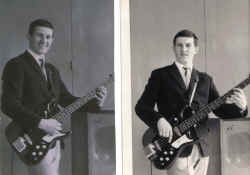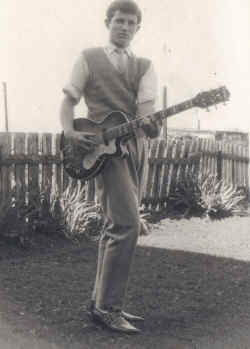
Tony Ross was a good-looking self-confident type of bloke, who was extremely enthusiastic about music. Sensing my own eagerness to learn, he invited me to his house in the next street on a regular basis, where in his bedroom he kept a small Vox amplifier and a Hofner Club 60 guitar – an impressive bit of kit!
He had already secured the bass player’s job in a top local group called Pete Nelson & the Travellers, whose members were to include Johnny “Mitch” Mitchell on drums, Tony Hall on rhythm guitar, later to become one of Britain’s best tenor saxophonists, and Vic Briggs on lead guitar, who later went to the USA with the New Animals.
Tony, whose nickname was ‘Pip’, used the bottom four strings of his Hofner for a while until he became the proud owner of a cherry red Burns Artist bass, “the next best thing to a Fender”, as he was often heard to proclaim. Throughout late 1960 into 1961, Tony Ross took me under his wing, and together we went to see bands at local gigs and youth clubs, whilst he played me the most important records of the period by Eddie Cochran, Gene Vincent and Ray Charles amongst others, showing me the bass lines on his new Burns, which I was eager to learn, even though I was still ambitious to play lead guitar.
To say that Tony Ross stood out amongst his peers would be an understatement. He seemed to have an aura about him that set him apart from others. He had an uncanny knack of foreseeing who would be big in music, and even which guitar models would be in vogue, and it was not long before it became obvious that he was developing a talent for playing bass which was to elevate him way above all the competition! As the Travellers grew in stature, it was not long before they decided to purchase new guitars.
Bert Kirby, my old tutor, had introduced me to a friend of his who was about to open a music shop in Hanwell, West London. His friend was a drum teacher called Jim Marshall. His little shop at 76, Uxbridge Road soon became a Mecca for budding musicians and top professionals alike, and it was here that I witnessed the three guitarists from the Travellers take delivery (after a six month wait) of two cherry red Gibson 335 guitars and one pink Fender Precision Bass guitar. I was present during this transaction only because I had agreed to buy lead guitarist John MacDonald’s Futurama, which Jim Marshall had promised me at the trade-in price of 20 guineas.
Of course finding 20 guineas was out of the question, but Jim kindly let me take the guitar away on the agreement that I would pay £1 per week, precisely the amount that I received from my Saturday job in the local butcher’s shop! Every weekend I would cycle to Jim’s shop and give him a one-pound note. He would duly fill in the card, until one day, after half the payments had been made, he wrote in large letters – PAID! across the card, and the Futurama was mine!
This became a pattern of generosity which Jim showed throughout the early years of his business, and so it is no surprise that his customers stayed loyal, and later flocked to buy his amplifiers, making Marshall one of the most recognised names in the business!
Meanwhile Tony ‘Pip’ Ross went from strength to strength, and of course it was inevitable that he would be poached by a professional group. The Flintstones were one of the most exciting groups around. Based loosely on the ‘Piltdown Men’ and ‘Sounds Incorporated’, they toured constantly and were making a good living when they added Ross to their ranks. For some reason he dropped the name ‘Pip’, and as two of the Flintstones were named Tony, he was re-christened “Rupert”, which he had sign-written in Gothic letters across the top horn of his Precision Bass.
I had now left Bishopshalt Grammar School with only 4 GCE O-level passes, and had no idea what to do with myself. My mother was working in Southall at Williams Brothers’ Grocers shop, and they were short-staffed, so I became a fixture for several months, serving on the counter, boning bacon, cutting up cheeses and being the gofer!! This was a very happy period in my life, free of school, earning a few bob, and getting to know the local girls who hung around the shopping parade.
Soon I had an invitation to join a local group who were making waves around Greenford and Southall. The ‘Cossacks’ were formed around the three Lewis brothers, two of whom played bass and rhythm guitars, and Keith who was the singer – apparently their father had come into some money and had kitted the boys out with the best equipment. Bragging of my new appointment, I was amazed at my increase in popularity with the girls. This didn’t last long however, as the Cossacks disbanded before I ever played a gig with them. Undeterred, I began networking between Hayes and Ealing, setting up rehearsals with many local players, trying to get a group going.
It was during a visit to Southall Community Centre, to watch the ‘Jaywalkers’ (who had an impressive guitarist called Ritchie Blackmore) that I bumped into two people who I had recently jammed with. Drummer Paul Tait and his bass playing pal Chas had secured a gig with a Wembley based outfit called The Delta 5. Paul explained that they needed a second guitar, and they had lots of gigs in the book. I needed no further persuading, and in a few days joined the Delta 5 line-up featuring Ricky Eagles on rhythm guitar, Ken Pickering on vocals with Paul and Chas on drums and bass. In no time we hit the road, playing every weekend. At last I was playing in a good group, and getting paid for it!
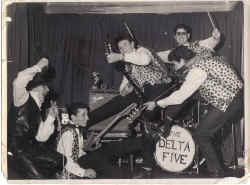 |
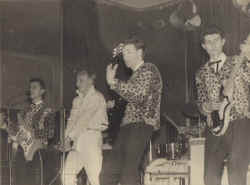 |
|
Nick Simper (guitar); with Ricky Eagles (rhythm guitar); Ken Pickering (vocals); Paul Tait (drums); Dave Hillyard-Jones (bass). |
|
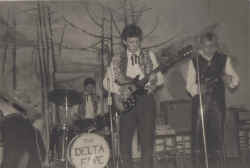
Rupert, meanwhile, continued to progress. It was always open house at 39 Ashford Avenue and Rupert introduced me to the sounds of the great lead guitarists such as Cliff Gallup, Scotty Moore and James Burton, as well as on the local scene Mick Green, Micky King and Big Jim Sullivan. The Delta 5 played some good venues, including the Ealing Jazz club, where we would pack the place on Wednesdays, whilst on Thursdays, new group the Rolling Stones pulled only a handful of people! Whilst many people praised my ability on lead guitar, I was beginning to realise deep down that I didn’t have what it takes to be another Mick Green!
About this time, another friend and neighbour, Micky Haskell would bring round records by Woody Guthrie and Big Bill Broonzy. Mick was running a club at the White Hart, Southall, and one memorable evening we witnessed blues artiste Cyril Davies doing a solo spot. “Forget yer Bloody Hank Marvin”, said Mick, “This is real guitar playing!” He wasn’t wrong either!!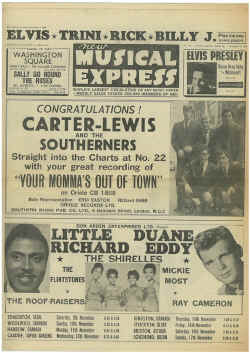
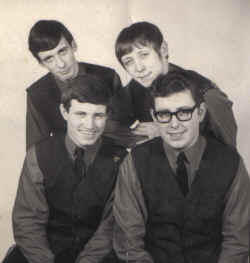
After a tour with the Everly Brothers and Little Richard (with the Flintstones being proclaimed Keith Richards’ favourite group), Rupert Ross quit to join probably the most underrated but one of the most talented outfits in England, namely Carter-Lewis and the Southerners. Based upon the hit song-writing duo of John Carter and Ken Lewis, the group boasted a line-up of Rupert Ross on bass, Viv Prince on drums and Jimmy Page on guitar. Jimmy was shortly to leave and so Rupert drafted in local boy (from the Downbeats) Micky Keane. This was a big period for Rupert, as John and Ken were writing hits for lots of acts, and it was necessary for the Southerners to demo these songs in the London studio at Southern Music. Whilst the Flintstones had cut two singles and half an unreleased album with the legendary Joe Meek, Rupert now found himself playing the part of a session man.
He still showed an almost clairvoyant approach, raving about new groups that he’d seen on the road, such as the Beatles and the Pacemakers. He sported what later became known as a Beatle haircut, and to some of us it seemed as if he was from another planet.
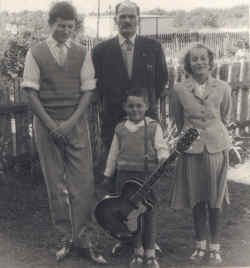
Rupert’s father, Ken, had started his own agency, ‘Ross Entertainments’, and at this time he was booking the Delta 5 and others into the local venues. It was during a Ken Ross gig at the Acre Hall, Northwood, Middlesex that a shocked Delta 5 and their audience learned of the assassination of U.S. President Kennedy in November 1963.
Whilst the Delta 5 carried on learning the trade, Tony Ross was undoubtedly becoming one of the country’s top bassists. Playing mostly with his thumb, he was rapidly becoming a legend in his own lifetime…


| Chapter 2 ← | → Chapter 4 |




